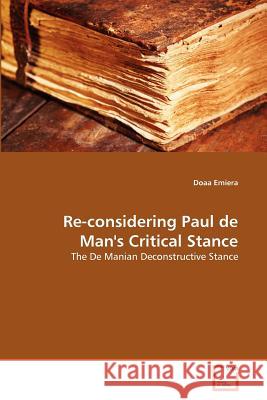Re-considering Paul de Man's Critical Stance » książka
Re-considering Paul de Man's Critical Stance
ISBN-13: 9783639366945 / Angielski / Miękka / 2011 / 180 str.
This study is an attempt to explore de Man's (1919-1983)critical stance in relation to the major critical schools during his literary career.The difficulty of reading Paul de Man is asserted in almost every study or research written on his works.To study the overall importance, impact, the meaning and significance of his thoughts and writing is a very difficult goal to achieve. Depicting de Man's critical stance cannot be located in the boundaries of "Deconstruction" alone.His writings expose his adherence to various critical techniques which he investigated all through his critical life.De Man was one of the first generation of literary critics to introduce explicitly theoretical deconstructive ideas into literary criticism.He is a controversial critic whose work inspires some critics and provokes others to read his deconstructive texts and redeconstruct them. This study is a re-consideration of de Man's critical process to reach an understanding of his critical stance through de Manian re-reading techniques.
This study is an attempt to explore de Mans (1919-1983)critical stance in relation to the major critical schools during his literary career.The difficulty of reading Paul de Man is asserted in almost every study or research written on his works.To study the overall importance, impact, the meaning and significance of his thoughts and writing is a very difficult goal to achieve. Depicting de Mans critical stance cannot be located in the boundaries of "Deconstruction" alone.His writings expose his adherence to various critical techniques which he investigated all through his critical life.De Man was one of the first generation of literary critics to introduce explicitly theoretical deconstructive ideas into literary criticism.He is a controversial critic whose work inspires some critics and provokes others to read his deconstructive texts and redeconstruct them. This study is a re-consideration of de Mans critical process to reach an understanding of his critical stance through de Manian re-reading techniques.











